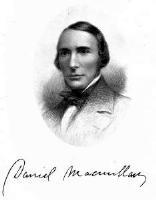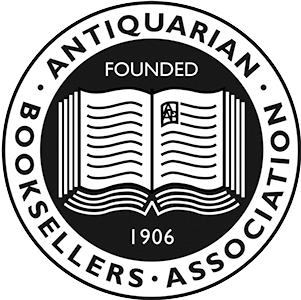Robert Bowes

Robert Bowes (1835-1919), who became ABA president in 1914, was born near Stewarton in rural Ayrshire on the 22nd August 1835, the son of another Robert Bowes, a man described on the 1841 Census as an agricultural labourer (although elsewhere as a gardener). Not perhaps the most advantageous start in life for someone with a life to make in the world of books, except that his mother, born Margaret Macmillan on the Isle of Arran in 1801, happened to be the somewhat older sister of the brothers Daniel and Alexander Macmillan who, starting from no more promisingbeginnings, were already set out on careers which saw them found the publishing house of Macmillan & Co., an imprint soon to become one of the most famous in the world.
Robert Bowes was probably no more than ten years of age when he was sent south to Cambridge to join the fledgling Macmillan firm, then an amalgam of bookselling, publishing, printing, and the supply of stationery. The 1851 Census picks him up as a fifteen-year-old apprentice, living with his uncle Alexander in the famous old bookshop at No. 1 Trinity Street, Cambridge – a site in continuous occupation as a bookshop since the sixteenth century (the oldest in the country they say) and which was to be his workplace for almost all of his career.

By 1863 the growth of the publishing side of the business necessitated Alexander Macmillan coming to London full time, while Robert Bowes returned to Cambridge to run the original bookshop on Trinity Street. On 15th April 1868, at St. Andrew the Great in Cambridge, he cemented his ties to the Macmillan family still further, marrying Fanny Brimley (1831-1903), younger sister of Alexander’s wife, Caroline. The two women were daughters of Augustine Gutteridge Brimley, a Cambridge grocer and provision merchant, alderman and sometime mayor of Cambridge. Their elder brother, George Brimley, had been appointed librarian at Trinity College in 1845. Ill-health and a life cut short at the age of thirty-seven in 1857 prevented his name becoming more widely known, but his essays and reviews of contemporary writers, including Tennyson, Carlyle, Thackeray and Dickens, led to a contemporary reputation as “one of the finest critics of the present day”.
Now brothers-in-law as well as uncle and nephew, Alexander Macmillan and Robert Bowes retained an interest and acted as partners in the Brimley, Whibley & Co. family grocery business until 1877. Robert Bowes also acquired the Brimley family house at 13 Park Terrace, Cambridge, facing Parker’s Piece, which remained his home until the end of his life, the household in 1881 comprising Bowes, his wife, their three children – Margaret Ethel Bowes (1869-1957), Janet Mabel Bowes (1871-1944) and George Edmund Brimley Bowes (1874-1946) – together with a cook and two housemaids.In that year, if not earlier, Robert Bowes became a full partner in the Cambridge bookshop, which became known as Macmillan & Bowes until 1907. The firm continued to publish as well as sell books both old and new. As a publisher, Bowes could claim a number of successes, not least J. K. Stephen’s Lapsus Calami 1891 (“When the Rudyards cease from Kipling / And the Haggards ride no more”), but it is as a scholar that he chiefly claims his place in the Oxford Dictionary of National Biography. A stalwart of the Cambridge Antiquarian Society, his investigations into the first Cambridge printer, John Siberch, led to Biographical Notes on the University Printers from the Commencement of Printing in Cambridge to the Present Time 1886, based on his original research. This was followed by A Catalogue of Books Printed at or relating to the University, Town & County of Cambridge, from 1521 to 1893 : with Bibliographical and Biographical Notes 1891-1894 – an illustrated catalogue of over 3,000 items and exact collations – a work “monumental and still unsuperseded” in David McKitterick’s phrase. And all the more remarkable in that this was “a bookseller’s catalogue, not a bibliography, and it therefore contains only the books we [Macmillan & Bowes] actually possess”.
Bowes had, moreover, become an authority on his early acquaintance Alfred Tennyson and in particular the evolution of the poems through successive revisions. His own annotated collection of Tennyson is now in Trinity College Library. He was also instrumental in preventing the original manuscript of Poems by Two Brothers being sold abroad – that too is now at Trinity.
He was prominent in Cambridge life from his early years, working with Alexander Macmillan and members of the university to found the Cambridge Working Men’s College in the 1850s. Later he joined Frederick Denison Maurice, Henry Sidgwick, and others to promote the higher education of women – Newnham College was founded in 1875 partly as a result. He served as a town councillor, a governor of the Perse School and of the Old Schools, and as chairman of the Free Library Committee.
In 1897 his son, George Edmund Brimley Bowes, having taken a degree at Emmanuel and spent some time in Glasgow learning the book trade, joined the Macmillan & Bowes firm, becoming a partner in 1899. The business was subsequently renamed Bowes & Bowes in 1907, a style it retained until 1986, although it had passed out of the family’s hands in 1953, when bought by W. H. Smith. It then became Sherratt & Hughes until 1992, when the famous old site became the home of the Cambridge University Press bookshop.
By now a widower, Robert Bowes served as president of the ABA in 1914, a position his son was also to fill in 1923. One of only two ABA presidents to have been born before 1850, he is the only one to have known the book trade from before that date. His 1905 monograph Booksellers’ Associations, Past and Present was perhaps influential in the founding of the Association. In a final honour to a distinguished life, Cambridge University conferred on him an honorary degree of Master of Arts in 1918. He died after a brief illness at the age of eighty-three at Park Terrace on 9th February 1919. Probate was granted to his daughter Margaret Ethel Hamilton, wife of Henry Smail Hamilton, his son George Brimley Bowes, and Walter Eaden Lilley, warehouseman – his effects stated at £16,582.7s.2d. The Bowes & Bowes archive, comprising early cash books, journals and letter-books, and a run of printed catalogues is preserved at the University of Reading.
Laurence Worms 2012
